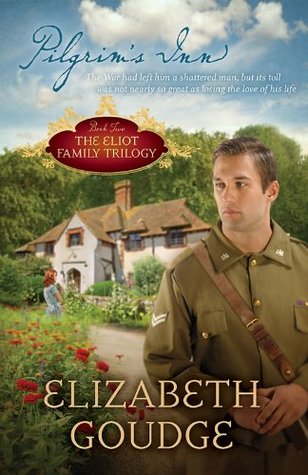 Pilgrim's Inn by Elizabeth Goudge
Pilgrim's Inn by Elizabeth Goudge Series: Eliots of Damerosehay #2
Published by Hendrickson on May 1, 2013 (re-issued)
Genres: Fiction
Source: my personal collection
Add to Goodreads

Also by this author: The Little White Horse, A City of Bells, The Blue Hills
Few understood David Eliot’s anguish at losing Nadine. He came back from the war a shattered and lonely man. But his return to the Eliot family refuge on England’s Hampshire coast is gradually pushing back the dark waters of soul and spirit.
Nadine and her husband have settled with their children into a wonderful old inn not far away. Surrounded by a wild and mysterious wood, the guesthouse seems to be able to mend minds and bodies. Pilgrims from the past and new ones now finding their way to this healing, comforting oasis sweep readers into a story of intertwining destinies, of love lost, and love forever gained.
The Herb of Grace
This lovely novel of healing and grace is one of my favorite Goudge books. The novel brims with Goudge’s characteristic compassionate understanding of human frailty and her ability to capture the spirit of place.
When George Eliot and his children tour the Herb of Grace, a historic riverside inn now up for sale, they fall in love immediately – as immediately and completely as Sally Adair had fallen in love with David Eliot, George’s nephew. Years ago, David and George’s young wife Nadine had fallen hopelessly in love with each other, but had chosen, in the end, to put their love aside.* But Nadine has never completely let go, and David is in the midst of a nervous breakdown after his war experiences, unable to move on.
Somehow, the Herb of Grace gathers them all in: George and Nadine… their children Ben, Tommy, Caroline, and the twins… Sally Adair and her father John, a famous portrait painter… handyman Jim Maloney and Annie-Laurie, haunted by her past… one by one the Herb of Grace weaves them together in a new pattern that brings healing and restoration to them all.
Pilgrim’s Inn (called The Herb of Grace when it was originally published) is the first of Elizabeth Goudge’s adult books I read, and it remains one of my favorites. Like A City of Bells, it gives the children and their experiences equal time with the adults, and Goudge handles their feelings and imaginings with a deft and sympathetic touch, as in this passage about Ben:
When he got home again he would try to paint what he had seen, or write a poem about it, letting the color and movement and strength flow out of his blood and muscle and bone upon the paper. But he would not show his work to either his father or his mother. . . He had learned not to. . . For George, who wanted his eldest son to follow him into the army, would in spite of his astounded admiration for his son’s cleverness rub his ear and look worried, the fear that Ben was not developing according to plan showing only too clearly in his eyes, and Nadine, who had decided on the diplomatic service for Ben, would glance at the painting or poem with the same tolerant, amused inattentiveness that she bestowed upon the twins’ games, and he would feel, as usual, utterly and completely futile.
It’s very much an ensemble book; no single character or couple dominates. One of the more important ongoing plotlines in the book occurs after the children discover a 16th-century fresco hidden under the wallpaper of the old chapel. The uncovering and cleaning of the fresco, as each creature and flower is restored to view, is a deliberate analogy for the structure and characters of the novel: one after another, each character is highlighted and drawn into a deeper, better relationship to the others.
There is a hint of magical realism about this book, which only adds to the sense of the luminous (or numinous) that pervades Pilgrim’s Inn. It runs alongside the strong and joyful Christian faith that undergirds all of Goudge’s writing. I don’t find her at all preachy, but it’s clear that her faith is at the heart of her writing as it must have been at the heart of her life. I think it’s best put in Goudge’s own words, describing the spirit of the Herb of Grace: “a strong pulse of creative joy that beats in this house,” and in the novel itself. “For all shall be well, and all manner of thing shall be well. . .”** By the end of the novel, all is well indeed.
* * *
* The Bird in the Tree (Elizabeth Goudge)
**Julian of Norwich, quoted by Goudge in Pilgrim’s Inn
Note: I reread my old copy of Pilgrim’s Inn, picked up decades ago in a used bookstore, but I chose to show the current cover and publication data above. Hendrickson has reissued all three books in the Eliot family saga over the last several years. Of the three, this is my favorite.

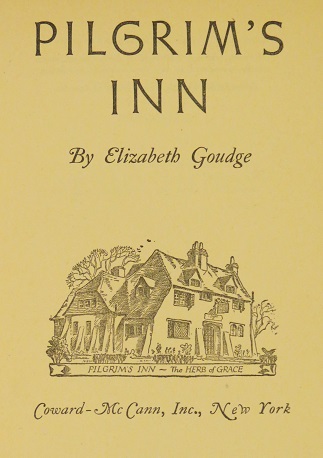



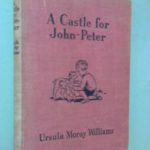
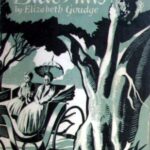
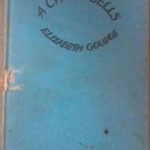
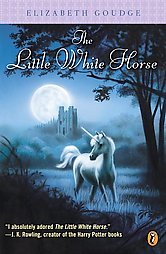



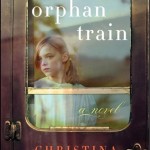

























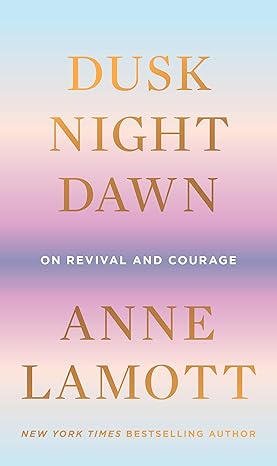
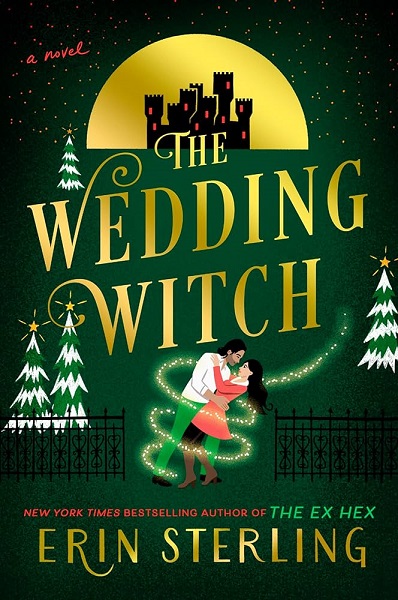









Katherine @ I Wish I Lived in a Library
I’ve never read any Elizabeth Goudge but this sounds like my kind of book. I love ensemble casts and healing and history. I’ll have to look for this trilogy.
Katherine @ I Wish I Lived in a Library recently posted…A Match Made on Main Street – Review + Giveaway
Lark_Bookwyrm
You might really enjoy her, Katherine! The middle of the three in this trilogy is definitely my favorite, though. The first one has an important character who is quite strongly anti-divorce, and I think that sentiment is reflected in the book to some extent – as you might expect from someone whose father was an Anglican clergyman and who was born around 1900. That bothered when I was younger, since my parents had divorced and my mother remarried; I didn’t have the maturity when I first read The Bird in the Tree to accept that it reflected the mores of a different era. (Heck, even when my parents divorced in the ’60s, it wasn’t that common, and lots of states still didn’t allow no-fault divorce.) Anyway, I don’t run into similar issues with her other books, and even The Bird in the Tree has a lot going for it. But I did want to give you a heads-up.
Lory @ Emerald City Book Review
My favorite too! The Herb of Grace is a wonderful place to be.
Lory @ Emerald City Book Review recently posted…Elizabeth Goudge Reading Week: Island Magic (Guest post)
Lark_Bookwyrm
It is indeed! I always wish it were real, so I could go stay there.
Lily
Awe this one sounds so good! A book featuring an ensemble of characters? YES PLEASE <3
Lily recently posted…The Summer After You and Me: Review
Lark_Bookwyrm
Lily, I’m so sorry I didn’t respond earlier! (Much earlier….) I hope you’ll give Goudge a try.
Red Iza
Oh, Elizabeth Goudge, she brings back so many memories of happy reading ! The first book I read by her was The city of bells, I was captured by her writing and the poetic atmosphere 🙂
Red Iza recently posted…The Sunday post #45 : Blog break, time out, hiatus, whatever, is beginning now !
Lark_Bookwyrm
I really love Goudge; her books are beautiful and the characterizations are so deft and rich.